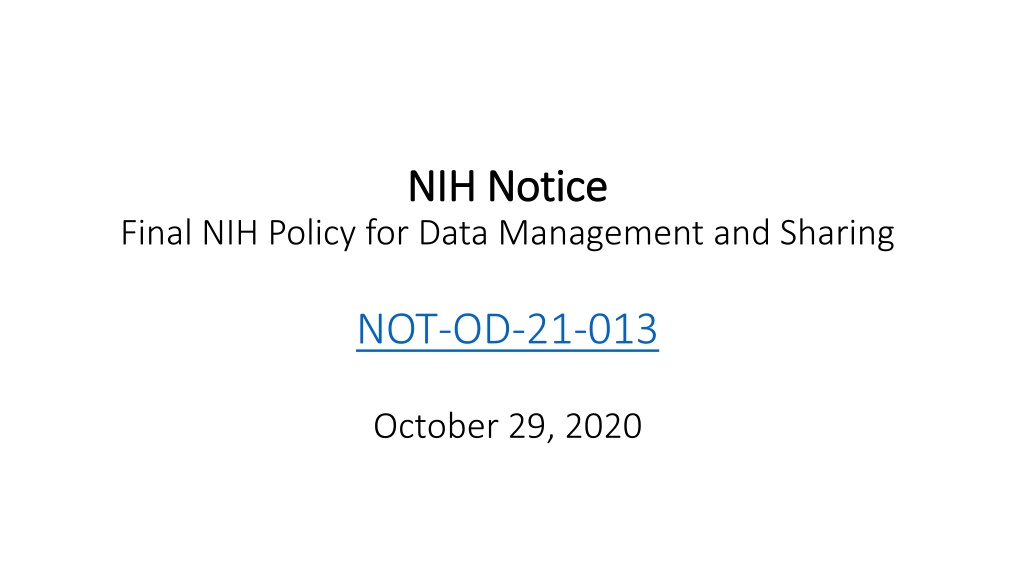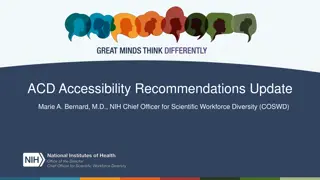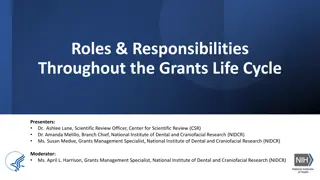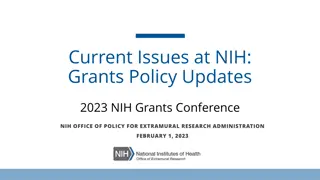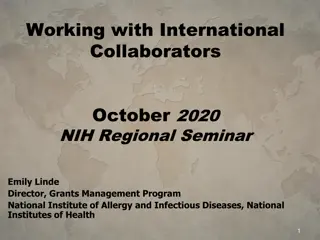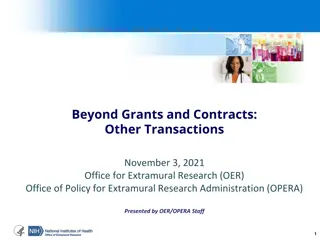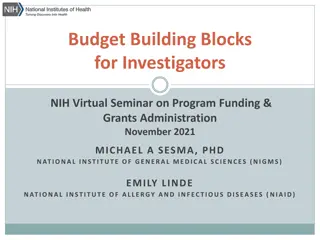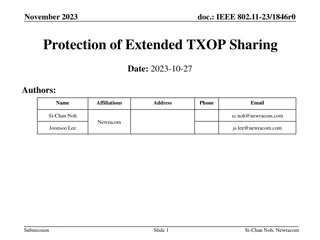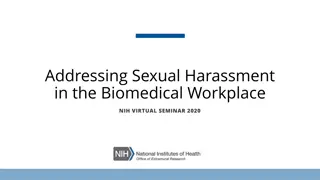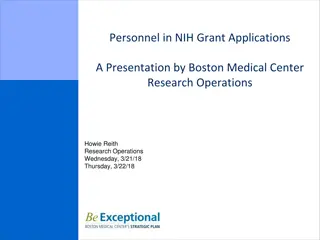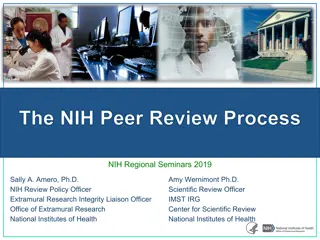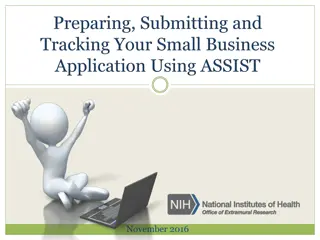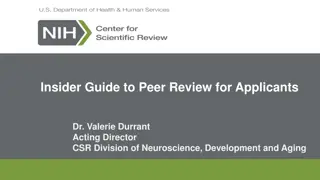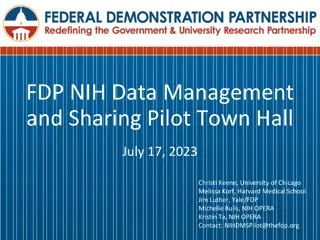Final NIH Policy for Data Management and Sharing
This document outlines the final NIH Policy for Data Management and Sharing, emphasizing the importance of scientific data quality, validation, and replication. It clarifies that scientific data should be of sufficient quality to validate and replicate research findings, irrespective of publication support. The policy requires the submission of a data management plan for extramural grants at the application stage to foster a culture where data management is integral to biomedical research projects.
Download Presentation

Please find below an Image/Link to download the presentation.
The content on the website is provided AS IS for your information and personal use only. It may not be sold, licensed, or shared on other websites without obtaining consent from the author.If you encounter any issues during the download, it is possible that the publisher has removed the file from their server.
You are allowed to download the files provided on this website for personal or commercial use, subject to the condition that they are used lawfully. All files are the property of their respective owners.
The content on the website is provided AS IS for your information and personal use only. It may not be sold, licensed, or shared on other websites without obtaining consent from the author.
E N D
Presentation Transcript
NIH Notice NIH Notice Final NIH Policy for Data Management and Sharing NOT-OD-21-013 October 29, 2020
Scientific Data The recorded factual material commonly accepted in the scientific community as of sufficient quality to validate and replicate research findings, regardless of whether the data are used to support scholarly publications. Scientific data do not include laboratory notebooks, preliminary analyses, completed case report forms, drafts of scientific papers, plans for future research, peer reviews, communications with colleagues, or physical objects, such as laboratory specimens.
Scientific Data Cont. We agree that data quality is an important concept to convey to ensure that scientific data are useful and to prevent data sharing from becoming a perfunctory administrative requirement, but rather one that should be done with the understanding that these data are intended to be used by others. Therefore, we have added to the definition that the data should be of sufficient quality to validate and replicate research findings. Even those scientific data not used to support a publication are considered scientific data and within the final DMS Policy s scope. We understand that a lack of publication does not necessarily mean that the findings are null or negative; however, indicating that scientific data are defined independent of publication is sufficient to cover data underlying null or negative findings.
Scientific Data end. We also note that while the final DMS Policy states that scientific data are those of sufficient quality to validate and replicate, we anticipate that shared scientific data will be used for a variety of purposes (consistent with applicable laws, policies, and limitations) including subsequent analyses, as suggested in the Purpose section of the final DMS Policy. Therefore, the concepts of validation and replication provide a standard for determining what constitutes scientific data and are not intended to limit uses of shared data.
Submission of a Plan The final DMS Policy requires submission of a Plan for extramural grants at application. This approach is more conducive to achieving NIH s goal of promoting a culture in which data management and sharing are recognized to be an integral component of a biomedical research project, rather than an administrative or additive one. While NIH is aware that this approach places the requirement on the general pool of grant applicants rather than on those likely to be funded, it is precisely this approach of prospective planning for data management and sharing that NIH hopes to promote and that a number of commenters suggested is crucial for ensuring more regular planning for data management and sharing.
Assessment of Plans The final DMS Policy maintains NIH Program Staff assessments of Plans merits. However, peer reviewers may comment on the proposed budget for data management and sharing, although these comments will not impact the overall score. This approach balances the benefit of consistency afforded by NIH Program Staff review of Plans, review of updates, and compliance monitoring, with the opportunity for peer reviewers to comment on the requests for data management and sharing costs. Over time, and through these reviews, we hope to learn more about what constitutes reasonable costs for various data management and sharing activities across the NIH portfolio of research.
Expectations NIH ICOs may supplement the Policy s expectations for Plans with their own complementary requirements to further advance their specific program or research goals. In addition, the Draft Policy stated the funding NIH ICO may request additional or specific information to be included within Plans to meet expectations for data management and sharing in support of programmatic priorities or to expand the utility of the scientific data generated from the research.
Expectations end. The DMS Policy represents the minimum requirements for the NIH, but NIH ICOs may expect more specificity in Plans. For example, NIH ICOs and Programs may wish to promote, via specific Funding Opportunity Announcements (FOAs) or across their research portfolios, the use of particular standards to enable interoperability of datasets and resources. We are appreciative of the suggestion about how to organize NIH ICO- specific expectations and will be working to ensure clear implementation materials for applicants and awardees.
Human Subjects DMS Policy does not introduce new requirements for protections for research with human participants. Existing laws (e.g., Certificates of Confidentiality), regulations (e.g., the Common Rule), and policies (e.g., the NIH Genomic Data Sharing Policy) continue to apply.
HS Cont. Included in the final DMS Policy three concepts that we believe are important to emphasize for investigators as they think through how to engage prospective participants regarding what is expected to happen with the data they contribute and, downstream, how best to respect these contributions.
HS Cont. First, it is encouraged that investigators consider, while developing their Plans, how to address data management and sharing in the informed consent process, such that prospective participants will understand what is expected to happen with their data. NIH also intends to develop resources to help researchers and institutions in communicating the intent to share data with prospective research participants.
HS Cont. Second, we note that any limitations on subsequent use of data (which may apply to non-human data as well) should be communicated to those individuals or entities preserving and sharing the scientific data. This ensures that factors that may affect subsequent use of data are properly communicated and will travel with the data.
HS Cont. Third, the importance of researchers considering whether, in choosing where and how to make their data available (if not already specified by an FOA or funding NIH ICO expectation), access to scientific data derived from humans should be controlled, even if de-identified and lacking explicit limitations on subsequent use. This approach honors the wishes and autonomy of the participants who contributed their data and is important to uphold, even if the data are de- identified. NIH may support development of resources to assist researchers and institutions in determining how to appropriately de-identify data from human participants, as well as for communicating data sharing in informed consent.
HS Cont. The final DMS Policy does not preclude the open sharing of data from human participants in ways that are consistent with consent practices, established norms, and applicable law. For example, open sharing of a compilation of a population s genotype at a particular locus may be an acceptable and established practice if consistent with informed consent. And importantly, we are aware that some patient communities prioritize openness to speed scientific progress and discovery. Nothing in the final DMS Policy is intended to prevent these approaches, as long as participants are appropriately informed and prospectively agree to them.
HS end. We emphasize that respecting participant autonomy and maintaining privacy of participants and confidentiality of their data can be consistent with data sharing. The DMS Policy sets the expectation that, through their Plans, researchers maximize the appropriate sharing of scientific data the DMS Policy does not expect that the informed consent given by participants to be obtained in any particular way, such as through broad consent.
When to Share The DMS Policy states that [s]hared scientific data should be made accessible as soon as possible, and no later than the time of an associated publication, or the end of the award/support period, whichever comes first. The DMS Policy is designed to increase the sharing of scientific data, regardless of whether a publication is produced. A single research project may take advantage of both approaches. Namely, researchers may share data underlying publication during the period of award but may share other data that have not yet led to a publication by the end of the award period.
Availability Period NIH encourages shared scientific data to be made available as long as it is deemed useful to the research community or the public. NIH has indicated a framework for helping researchers think through a minimum time period for data availability. Providing this framework is anticipated to help researchers both develop Plans and also budget accordingly for data management and sharing costs, when needed. Existing requirements and expectations set forth through, for example, applicable record retention requirements, repository policies, and journal policies may guide researchers as they seek to define minimal periods for data availability. However, NIH encourages researchers to propose longer time periods that may be informed by other factors, such as anticipated value of the dataset for the scientific community and the public.
Where to Share DMS Policy strongly encourages the use of established repositories to the extent possible. This reflects NIH s preference that scientific data be shared and preserved through repositories, rather than kept only by the researcher or institution and provided on request, with the recognition that this is not always a practical or even a preferred approach. NIH has released the Supplemental Information to the NIH Policy for Data Management and Sharing: Selecting a Repository for Data Resulting from NIH-Supported Research (NOT-OD-21-016), which will aid researchers as they choose suitable repositories for the preservation and sharing of data. This supplemental information is discussed in more detail below.
